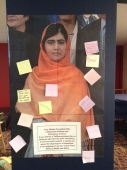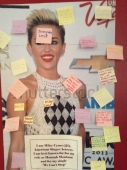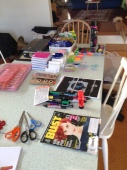I’m pleased to announce that Auckland Libraries’ XXUnmasked media literacy project for teenage girls has just won an award for community outreach. This week on the blog, Tracy Dawson of Parkes High School Library in Australia reports on the project led by Ali Coomber of Auckland Libraries and Dr Pani Farvid of Auckland University of Technology.
XXUnmasked – double the power, not the standards!
Something that always amazes me is when young girls say “I’m not a feminist.” When any woman says it, actually. I remember several years ago, in my previous guise as an English teacher, talking to a group of top senior English students studying what was then called 3 Unit English in New South Wales. We were discussing the brilliant Margaret Atwood’s The Handmaid’s Tale, and despite that horrific and unsettling story of the loss of female identity, voice, independence, none could see the value of feminism.
Now when feminism is often seen as a dirty word at the same time that all-pervading media images of women are more blatantly misogynistic than ever, how do we help our young women avoid being active participants, let alone passive observers, in their own diminution?
Dr Matt Finch, who for six months recently was the Parkes High School and Parkes Shire Council Reader in Residence, instigated a joint initiative between Auckland Libraries (AL) and Auckland University of technology (AUT) called XXUnmasked. In his previous work as an adviser for AL, Matt brought together a group led by librarian Ali Coomber and academic Dr Pani Farvid (AUT) to devise this pilot program. Its aim was to encourage teenage girls to recognise and cope with the pressure place on them by the media.
Ali and Pani have kindly shared their experience with me as something that may work with our current strategies at Parkes High School to empower girls to succeed.
The Pilot Program
Auckland Libraries, like all public libraries, have a role in engaging children and teens in the community. In Ali’s words, the pilot aimed to help teenage girls understand that “they are heavily targeted by media. Their perception of themselves is very much influenced by this and we wanted them to understand this, plus what their choices were and how to have a voice. They are the future, and it is important (for them) to ask questions and express their views.”
Although the pilot aimed to have a small group of participating girls, there were no selection criteria so no-one was excluded. Word of mouth and Facebook promotion attracted a group of eighteen teen girls, one aged 18 years and the rest between 13 and 17.
An email group was set up, as was a Facebook group page (membership by invitation only) to ensure clear communication. Regular meetings invited input and feedback, set up tasks and allocated them to volunteers. It was a true community approach, “with all members having a strong driving passion to be able to offer this to teen girls – there was a genuine concern about media influence and its impact on girls.” In terms of what the collaborators had to offer, AUT had evidence based information and experience in presenting to schools; Auckland libraries had venues for workshops and importantly, staff who are trained librarians specialising in youth and who were passionate about helping these girls.
The Workshops
“The program seeks to teach girls analytic skills that help them dismantle harmful and limited media depictions, and empowers them to embrace themselves and promote diversity in the media,” explained Pani.
So, a variety of strategies in the pilot helped to engage the girls in the complex concepts of media methodology and influence:
- Library resources, sponsors’ ‘goody bags’, websites, activities and a notes page
- An introductory PowerPoint presentation produced by Pani
- Selected media items, including magazine advertisements (some directed at women, some at men in the same publication) reality TV and music clips were discussed in groups
- Posters of different women were displayed on the walls and the girls attached a post-it note to each image, describing their thoughts about each woman as a role model
- Two inspirational female speakers, a film director and an engineering student, spoke to the girls and showed what they were capable of achieving.
The Outcomes
Most of the girls completed the feedback form offered. They were overwhelmingly positive about this pilot program, especially about the guest speakers and the group work. All respondents said they felt better about themselves, with comments ranging from “I now realise that the people in magazines have been airbrushed” and “I’m empowered and I can take this back to the people at my school and in my body image group” to “I Feel like we need to stand up if we aren’t okay with media messages.”
Fifteen of the respondents were able to identify at least two things the program taught them, about sexism and objectification, that feminism takes many forms, and about the need for women to speak up. Several commented that they would like more discussion and interactivity, and to touch on other subjects like rape, types of beauty, gender and cultural stereotypes.
Some of the positives to come out of the workshop included the girls realising they were not alone in their feelings about themselves and the sharing of ideas between younger and older girls. Different demographic mixes may enrich this aspect of the program in the future.
Ali believes the girls “developed an awareness of choices available plus the possibility of their power to influence media and/or get their messages out to others. They are aware there are concrete actions they can take.”
The Future
Ali and Pani would like to see XXUnmasked becoming a regular community service delivered by Auckland Libraries and AUT, in libraries and possibly with schools. “Building relationships with teens, and therefore schools is vital for the future”, says Ali.
Future workshops would see completed activities from the Resource Booklet posted and shared on the XXUnmasked Facebook page and shared with local schools and libraries. The collaborative approach and sharing of outcomes will provoke thought and facilitate discussion in the community about the influence of the media on teenage girls and women. A consistent approach will benefit the community in terms of empowering its girls, and each successive group that participates will strengthen the collective and individual voice to influence their peers and younger girls. The safe Facebook group will enable girls to grow, strengthen and share positive messages about self-image and responses to daunting media pressure.
Here in Parkes, the High School has a Girls’ Strategy Group, a group of mostly Year 10 girls who meet to discuss positive and assertive strategies for coping with social and academic issues at school. The group also focuses on the images of girls and women portrayed in the media. It would be great to share some of the collaborative approaches piloted in Auckland, especially in the empowering use of social media as opposed to its use as a tool to bully and divide, and those developed by Parkes in concert with the local Council, local employers and the community. What XXUnmasked is aiming for in New Zealand should be what we all want for our girls. It also shows the integral role libraries play in bringing together various stakeholders for the benefit of the whole community.
Congratulations to the XXUnmasked team for their recognition as community outreach pioneers! Here at my blog, you can also find out about Pani’s previous work with Auckland Libraries on the Dark Night Burlesque project, and read Tracy Dawson’s thoughts about library design.



4 thoughts on “Guest post: XXUnmasked at Auckland Libraries”